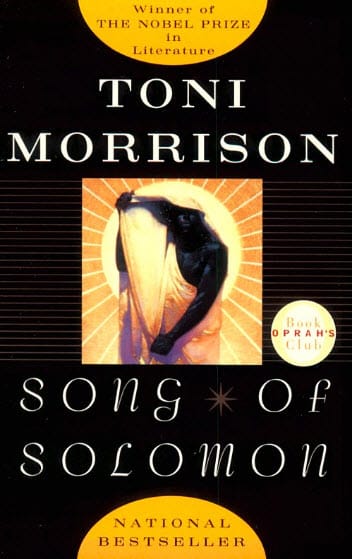As Milkman watched the children, he began to feel uncomfortable. Hating his parents, his sisters, seemed silly now. And the skim of shame that he had rinsed away in the bathwater after having stolen from Pilate returned. But now it was as thick and tight as a caul. How could he have broken into that house--the only one he knew that achieved comfort without one article of comfort in it. No soft worn-down chair, not a cushion or a pillow. No light switch, no water running free and clear after a turn of a tap handle. No napkins, no tablecloth. No fluted plates or flowered cups, no circle of blue flame burning in a stove eye. But peace was there, energy, singing, and now his own remembrances.
Toni Morrison's Song of Solomon opens with this very crytpic sentence: "The North Carolina Mutual Life Insurance agent promised to fly from Mercy to the other side of Lake Superior at three o'clock." To the story, the agent is nobody, a non-character, but his attempted flight--you can guess how it turns out--provides the guiding symbol for the rest of the novel: a man, alone, making a leap that, no matter how it ends, will take him away from his town, his home, and his family. There are other flights in the novel, too: The protagonist, Milkman Dead, learns that his great-grandfather was reputed to be part of a legendary tribe of "flying" slaves in the antebellum South; at the end, Milkman too leaps into the air, his flight perhaps the most ambiguous of them all.
It's not hard to believe that someone in the world of Song of Solomon might able to fly. Morrison crowds her plot with a number of details borrowed from Magical Realism: Milkman's Aunt Pilate, for instance, born just after her mother's death, has no navel. Another character seems to be immortal. Morrison's story bumps right up to the edge of realism, and when it's not fantastical, it's consistently weird. But at the same time, it's one of Morrison's most straightforward works. She explains in the (really great) foreword that, for Solomon, she abandoned the more complex experiments with time that characterize some of her other books because the traditional progression seemed more fitting for the male protagonist. That's something I never would have thought of.
At its heart, Song of Solomon is a conventional novel; a bildungsroman about Milkman that follows him from his birth to his moment of "flight." Morrison carefully details not only Milkman himself but his family--his greedy, callous father Macon, his abused mother Ruth, his sisters Lena and Corinthians, his otherworldly aunt Pilate, her granddaughter Hagar, whom he loves then abandons. Each of these characters gets a really intricate, detailed plotline; to Morrison's credit, nothing among them seems extraneous and unnecessary. In the second part of the novel, Milkman retraces Pilate's life history in Pennsylvania and Virginia searching for a sack of gold she described to him. The gold, reliably, is a MacGuffin--what he really discovers is the story of his family, of flying Solomon, and the rest of his great-grandparents. And just as reliably, he comes out of the experience a better person--regretful for the way he has treated Hagar, loving toward his parents, etc., etc.
That sounds hokey and cliched, but man, it works. I think part of the genius of Song of Solomon is that Morrison finds the perfect balance between this well-worn structure and the accumulated strangeness of Milkman's family. I don't think that my description of it has been really sufficient, but the book's greatness relies in its many intricate details, and I don't think reciting them here would really provide an understanding of how well they work together.


No comments:
Post a Comment